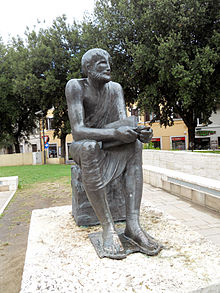 In my previous post I cited a “Distinguished Scholar”‘s textbook summary of Middle Platonic ideas that formed part of the background to early Christianity. I continue this post with a discussion of the philosopher who introduced ‘demonology’ into Platonic philosophical views during the century preceding that of Paul and the earliest Christians.
In my previous post I cited a “Distinguished Scholar”‘s textbook summary of Middle Platonic ideas that formed part of the background to early Christianity. I continue this post with a discussion of the philosopher who introduced ‘demonology’ into Platonic philosophical views during the century preceding that of Paul and the earliest Christians.
In an earlier post I quoted translated passages from two Middle Platonist authors given prominence by Everett Ferguson, Philo and Plutarch, that depicted their particular views of cosmology and the place of demons in the universe. That post upset some readers who appeared to take exception to the posting of evidence from primary sources that lent support to the discussion of Earl Doherty in his publications arguing that the Jesus originated as a mythical construct. A significant part of Doherty’s discussion focuses on the way certain Middle Platonic views informed the intellectual background to the New Testament epistles.
Since that post I’ve had more time to look a little more closely at one of Earl Doherty’s sources, The Middle Platonists, by John M. Dillon. Continue reading “Demons 101 – Early Christianity’s Middle Platonic Background”
